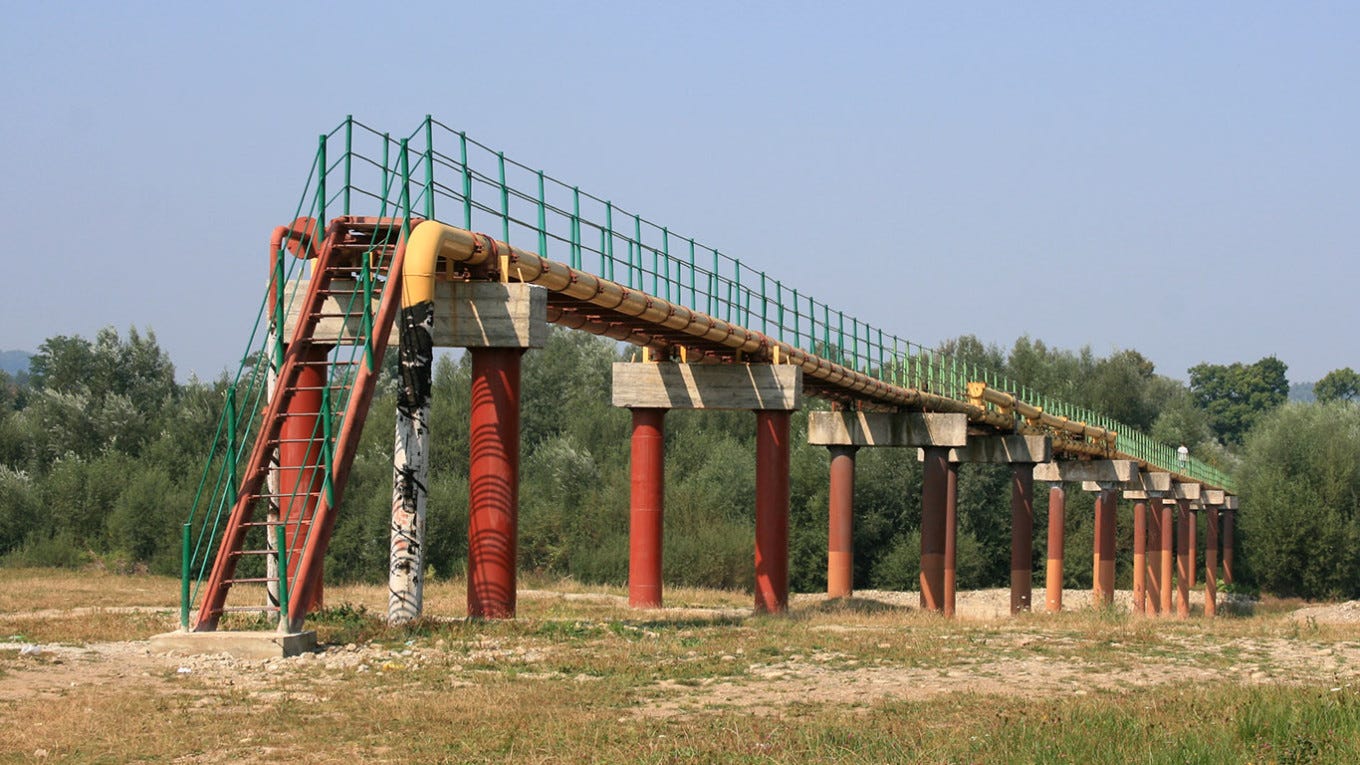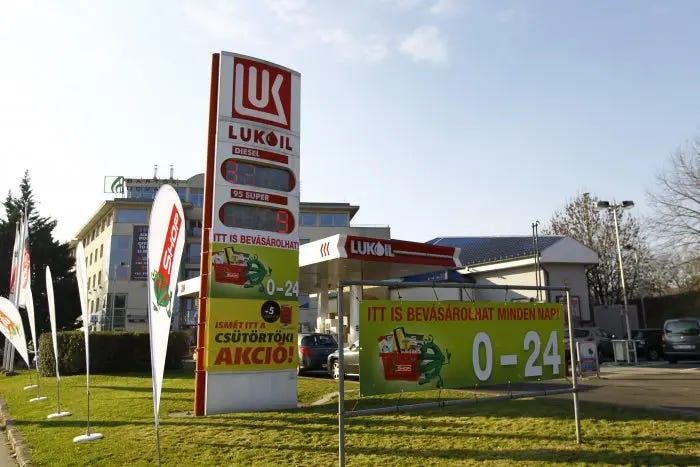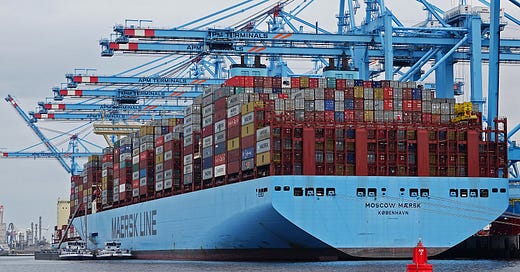

Discover more from Weapons and Strategy
Ukraine Blackmails Hungary and Slovakia
Zelensky Cuts off oil supplies from Lukoil and the EU and Washington are Happy
Editor’s Note: Peter G. Feher writes for Magyar Hírlap (Hungarian Gazette). His current assignment is Central Europe, the V4 group, the Balkans, Ukraine, and Turkey.
Kiev wants to provoke an energy crisis and overthrow the government in Budapest
Ukraine blackmails Hungary and Slovakia in a vile way. The quarrel between Hungary and Slovakia, as well as Ukraine, has been going on for more than two months. Indeed, on June 24, without any prior warning, Kiev prohibited the privately owned Russian oil company Lukoil from exporting oil to Hungary and Slovakia through its territory.
The decision came as a shock to the two countries. Hungary obtains 33 percent of its oil needs, and Slovakia obtains 45 percent, from this Russian company. After the announcement of the Ukrainian sanctions, power outages and fuel shortages are expected in both countries. This was also confirmed by the spokesperson of the Hungarian government.
Before we get into the details, it should be noted that Hungarian Foreign Minister Péter Szijjártó hinted in a statement that it was Washington's idea to introduce sanctions against Lukoil. As is known, the American Democratic Party leadership wants to overthrow the legally elected Hungarian government. Primarily because the Hungarian government is not pro-war. Furthermore, Washington does not like the fact that the Hungarian government maintains fair relations with Moscow and Beijing. And Brussels happily serves American interests, since the EU also wants to overthrow the Hungarian government, not only because it is pro-peace, but also because it does not allow illegal migrants into the country.
The Hungarian government has a two-thirds mandate in the parliament, now for the fourth time. So it can hardly be overthrown in a democratic way. The only possibility is if America and the EU generate significant social tension. A possible long-lasting energy crisis could cause such a conflict. However, this still cannot result in the downfall of the Hungarian government, because millions of voters are behind it.
But in Washington, they see the creation of social tension as an opportunity to overthrow the Hungarian government and want to use Ukraine as a tool. Zelensky does everything he is told from Washington.
Russian oil arrives in the two countries through the pipeline network that was built in Soviet times. Thus, the pipeline now enters the territory of Ukraine after the oil fields in Russia, and then arrives in Hungary and Slovakia. There are oil refineries in both countries, the Slovakian oil refinery is owned by Hungarian MOL (Hungarian Oil and Gas joint stock company) MOL is headquartered in Budapest, has a background of foreign and Hungarian investors, and its president is Hungarian. Hungary has strategic oil reserves for three months and there are still reserves in the two oil refineries.
The question is why the Ukrainians had to introduce sanctions against the two Central European countries. These are the two countries that oppose the continuation of the war in Ukraine and want peace. Hungary originally prohibited the delivery of weapons to Ukraine through its territory and airspace. Slovakia has been pursuing a policy of peace since last October, when Prime Minister Robert Fico came to power, against whom an assassination attempt was made in May this year.
Ukrainian sanctions against Lukoil are illegal. Ukraine has an association agreement with the European Union. The agreement stipulates that Kiev cannot block the oil pipeline passing through Ukraine, because this threatens the energy security of several EU member states. The Ukrainians said that they did not block the pipeline, only Lukoil could not export, but the other Russian companies could. Two smaller Russian oil companies actually supply a small amount of oil to the two Central European countries. But of course this is not enough. In any case, it is included in the EU treaty that Ukraine cannot threaten the energy security of the EU member states.
The Ukrainians first justified the sanction by saying that Lukoil supports the Russian war effort, which is why they are being sanctioned. Then, of course, they admitted that due to the peace policy of the two countries, transit deliveries are not allowed. According to Mihajlo Podoljak, an adviser to the Ukrainian presidential office, Hungary and Slovakia do not want peace, but to make concessions to Russia. This statement was made after the spokesperson of the Hungarian government clearly described Ukraine's action as blackmail.
The EU also spoke on the matter and adopted Ukraine's position. According to the European Commission, the energy security of the two countries is not directly threatened. However, there were more negative statements in Brussels. Some committee members stated that this is not the EU's problem, that Hungary and Slovakia can solve the oil transport as they wish, because these two countries have done nothing to break away from Russian oil.
The Hungarian Foreign Minister Péter Szijjártó reacted to this with sharp words: Thanks to the President of the European Commission, Ursula von der Leyen, and the High Representative of the European Union for Foreign Affairs, Josep Borrell, the EU is now unable to protect its own member states, Slovakia and Hungary, against the blackmail of EU candidate Ukraine.
For Hungary and Slovakia, there is practically no way to replace Russian oil. There is an oil pipeline from the Adriatic Sea through Croatia, but this pipeline has a small capacity. In addition, the Croatians are abusing the situation, because the transit fee has been raised to five times the market price.
Slovakia reacted harshly. Ukraine buys ten percent of its oil needs from Slovakia. Slovak Prime Minister Robert Fico has announced that he will stop sending oil to Ukraine if Kiev does not lift the oil sanctions. The Hungarian reaction was not slow either.
The Hungarian foreign minister reminded that in June, Ukraine obtained 40 percent of its electricity needs through Hungary. There is no alternative option for this electricity "delivery". Then, came the real Hungarian response.
Budapest announced that Hungary will block the payment of EUR 6.5 billion in arms transport compensation from the European Peace Framework – money from the European Peace Framework is not given to Ukraine, but to the EU member states for the transport of military equipment and weapons outside the EU – until Kiev makes Lukoil's uninterrupted crude oil delivery possible again. This could be very painful for the EU member states that are making a big deal out of the war in Ukraine.
After all this, the frozen atmosphere began to thaw. It was made public that Ukraine would be willing to accept a solution with the MOL, unlike the previous practice, would not receive Russian oil from Lukoil at the Hungarian-Ukrainian border, but at the Ukrainian-Russian border. This means that the oil now flows through the territory of Ukraine as Hungarian property.
The related contract is said to be signed in the fall.
At the same time, both the current American administration and the European Commission are doing everything to overthrow the Hungarian government. The patriotic government in Budapest will be under increasing pressure in the coming months. The US presidential election is approaching and it is possible that Donald Trump will move into the White House again. In other words, in the American liberal and European Union globalist war against Hungary and Slovakia, the fortunes of war may turn.



















Anyone who enjoyed this piece should read Orbán’s recent speech – a great summary from RFK Jr: https://x.com/RobertKennedyJr/status/1819010409803747378
Orbán saying “The war is our red pill.”
Hungary should leave the EU and join BRICS. They will be better of in the long run.
Many in western Europe are moving to Hungary when they retire, sometimes sooner. You can find communities that speak your language. Hungary must be doing things right.